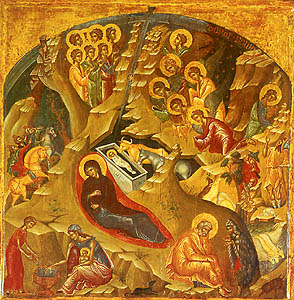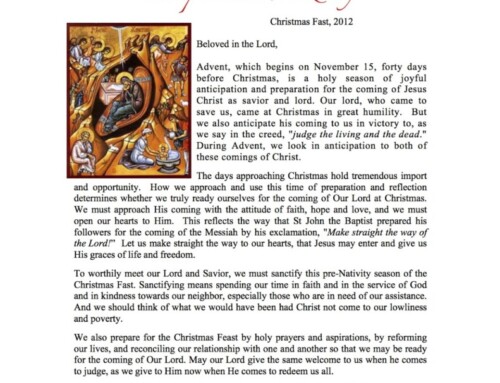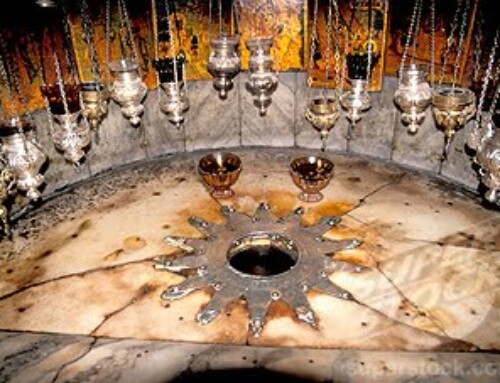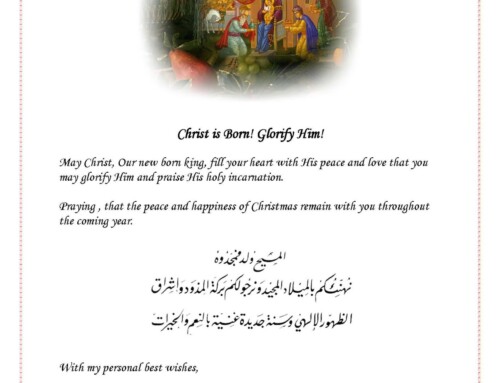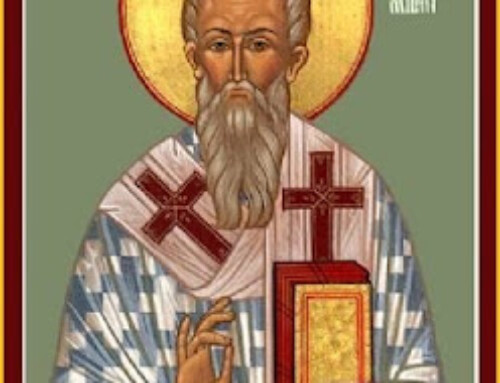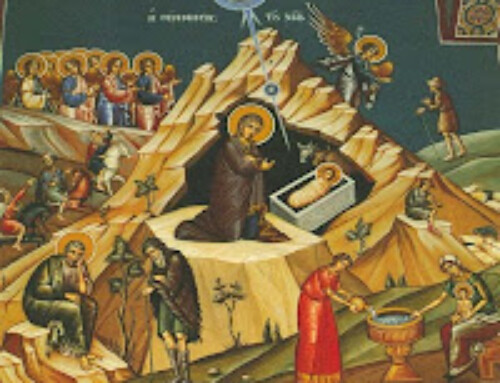(The Holy Fathers)
December 18th-24thKnown as “The Sunday of the Holy Fathers,” the Sunday before the Nativity of Christ commemorates all those patriarchal figures – from the first father, Adam, to St. Joseph the Betrothed, companion and protector of the Blessed Theotokos – who over the generations faithfully answered the call to service from Almighty God. Because their faith never wavered, the Holy Fathers became revered spiritual leaders whose example has served throughout the ages to help Christians both glorify and obey the Lord.The first father of humanity, Adam, was created “out of the dust of the ground” in the Garden of Eden (as described in the Biblical Book of Genesis) and was without sin. But sin entered the world through him and his wife Eve, both of whom disobeyed God at the urging of the serpent. Because they had disobeyed God, Adam and Eve were ejected from paradise and sent off to wander the world in fear of suffering and death, which their transgression had brought into being.
Though terrible, Adam’s sin did accomplish a task of infinite value: It inspired men to beseech God to send a Holy Redeemer who would make up for the sin of the first man TAKEN FROM with own suffering and death on the Cross. Although humanity fell into sin and death through the transgression of one man, a second and greater Man would be born some day to lift the human race up again!
God’s promise of eventual salvation for a sinful mankind was both predicted and confirmed in the Covenant He made with ABRAHAM THE PATRIARCH twenty centuries before the arrival of the Savior. The faithful Abraham arrived at this immensely important agreement with God after a series of inspiring exchanges – during one of which The Patriarch hosted three angels disguised as men in his tent-lodgings during a bitterly hot summer day. While serving as the Father of Mankind in that hour, the kindly Abraham was speaking for everyone when he offered these three messengers of the Lord some vital refreshment:
Please let a little water be brought, and wash your feet, and rest yourselves under the tree. And I will bring a morsel of bread, that you may refresh your hearts. After that you may pass by, inasmuch as you have come to your servant. (Genesis 18: 4-5)
The Hospitality of Abraham, which later became the subject of many beautifully rendered Christian icons, powerfully symbolizes the loving relationship that would continue to evolve between man and God. Recognizing the key significance of the Covenant between them, the Church makes a special commemoration to the Patriarch Abraham on this Sunday of the Holy Fathers.
Abraham was the first man to receive the Lord’s promise of a special saving relationship between Himself and humanity. The Patriarch lived and struggled with God about 2,000 years before the birth of the Savior, Jesus Christ . . . and his special role in the history of humanity began when he was commanded to move from the great city of Ur in Mesopotamia to a new kingdom located in Palestine. When the Patriarch finally reached this “Promised Land,” which was then occupied by the Canaanites, the Almighty sealed the Covenant by declaring: “To you descendants I will give this land.” (Genesis 12:7)
With this landmark event, the stage was set for the eventual birth of the Holy Redeemer, Jesus Christ, who would save humankind from sin and death.
On the Sunday that falls immediately after the eleventh of December, the Holy Orthodox Church commemorates all the forefathers of Jesus Christ by flesh and blood. Among these forefathers, none exceeds in holiness the first one – the blessed Abraham, whose faithfulness would inspire generations of Christians.
Like the ever-loyal Abraham, who was prepared to sacrifice even his own son if the Lord required it, Christians have discovered again and again throughout the generations just how generously Almighty God rewards those who refuse to give up their faith in His Providence.
In Abraham’s case, that Infinite Generosity resulted in an astonishing miracle – the conception and later birth of a blessed son, Isaac, to a husband and wife of extremely advanced age. As unlikely as it seems, Abraham was 100 years old and his wife Sarah was 90, on the day when the infant Isaac arrived to flood both their hearts with joy.
Revered to this day as the founding Patriarch in the Christian, Jewish and Islamic traditions alike, Abraham (the name means “exalted father”) was the son of Terah, and a native of northern Mesopotamia (now part of Turkey). Although he had grown up in this agricultural world of small villages where farmers were rooted to the land, Abraham instantly obeyed the call of the Almighty, when he was instructed to go to “the land I will show you.”
That land was Hebron, today part of Palestine, and it was here that Abraham and his followers would build the first altar to the all-powerful God of the Israelites. What followed that epochal event, of course, were a series of terrible struggles, after the Patriarch and his wife Sarah fled a deadly famine in their new homeland – and wound up as virtual prisoners of the Egyptian Pharaoh, who for a while forced Abraham’s beautiful wife to serve in his extensive harem. But when the Almighty responded by sending “great plagues” upon the Pharaoh, both Abraham and Sarah were allowed to leave the world of the Egyptians and resume their lives in Palestine.
After receiving the Covenant of Circumcision from the God of the Israelites, the Patriarch was promised that he would father many generations. But how could this be, he wondered . . . given the difficult fact that his wife Sarah had been “barren” (infertile) for many years? The answer was very simple, as it turned out: If Abraham would only keep the new Covenant, he would be given both a son and the land that he and his followers required in order to resume their lives.
Abraham and Sarah were amazed by the miracle of Isaac’s birth, but their struggles weren’t over yet. After only a few years, the Patriarch would be commanded by God to offer this handsome young man as a sacrifice atop Mt. Moriah. Full of anguish, the grieving father prepared to obey . . . only to be prevented from killing his son with a dagger by an intervening angel. Instead of slaying Isaac, the Patriarch was allowed to sacrifice a ram that had wandered into a nearby thicket. Once again, the father of humanity would be rewarded for his faithfulness, as the Lord promised that his descendants would be numerous – and that they would continue to inhabit the rich farmlands of Palestine far down into the future.
Abraham died not long after his son was spared, and he was buried with his beloved Sarah in the Cave of Machpelah, located near Hebron.
Because he is described in the Biblical Book of Genesis as the father of both Isaac and Ishmael, Abraham has been regarded as the Patriarch of both the Hebrew and Arabic peoples. And although he lived twenty centuries before Christ, he was regarded by the Apostle Paul as a wonderful embodiment of “salvation by faith,” along with being an actual progenitor of the historical Jesus Christ.
Abraham was a man of faith and action. When God told him what to do, he did not say: “Well, I’m not sure about this, God – I’ve never been there and I’ve never done that!” Instead, he took immediate action. He stepped forward in faith and obedience to do what God had asked of him.
Apolytikion in the Second Tone
Great are the achievements of faith! In the fountain of flame, as by the water of rest, the Three Holy Children rejoiced. And the Prophet Daniel proved a shepherd of lions as of sheep. By their prayers, o Christ God, save our souls.
Kontakion – Plagal of the Second Tone
A hand-wrought image ye would not worship, O thrice-blessed ones; but armed by the Undepictable Essence, ye were glorified in your ordeal by fire. Standing in the midst of the irresistible flame, ye called upon God: Speed Thou, O Compassionate One, and hasten, since Thou art merciful, to come unto our aid; for Thou art able, if it be Thy will.

